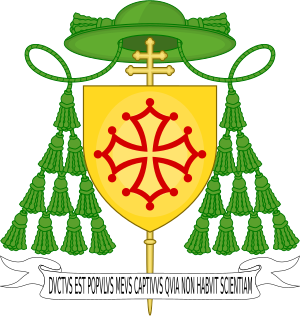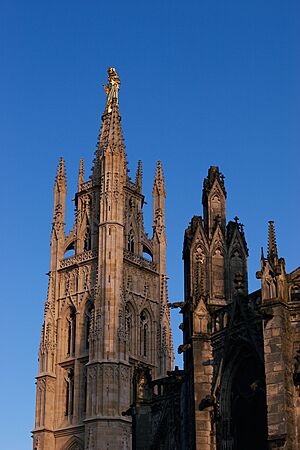Pey Berland facts for kids
Blessed Pey Berland (born around 1380, died January 1458) was a very important leader in the Church. He served as the Archbishop of Bordeaux from 1430 until he retired. This was a crucial time for the city of Bordeaux and the region of Gascony. During his time as archbishop, Bordeaux stayed loyal to the King of England in the final part of the Hundred Years' War. However, the French army eventually took control of the city in 1451.
Contents
Pey Berland's Early Life and Education
Pey Berland was born in a small village called Saint-Raphael, located in Avensan in central Medoc. Even though he came from a peasant family, he received an early education from a retired local notary. A notary is like a legal assistant who helps with official documents.
Later, Berland moved to Bordeaux to continue his studies and join the Church. He went to the University of Toulouse and earned a degree in canon law. Canon law is the set of rules and laws used by the Christian Church. He became a priest at a young age, which was unusual for that time.
He then caught the attention of Francesco Uguccione, who was the Archbishop of Bordeaux before him. Uguccione asked Berland to be his personal secretary.
Travels and Rise in the Church
As a secretary to an important church leader, Berland traveled a lot in the early 1400s. In 1408, he went with Uguccione to England. They were trying to convince the English to send people to a big meeting called the Council of Pisa. This meeting was trying to solve a problem in the Church called the Western Schism, where there were multiple popes at once.
From England, Berland and Uguccione went to Italy. In 1410, the archbishop rewarded Berland with a special position at the Cathedral of Saint-André. This position included land and parishes in nearby areas like Bouliac, Quinsac, and Lormont.
In 1412, while they were in Florence, Uguccione died. Berland made sure he was properly buried. After that, Berland went on a pilgrimage to the Holy Land before returning to Bordeaux.
In 1413, Berland received another reward. The Pope at the time, Antipope John XXIII, remembered Uguccione's wish to help Berland. So, he gave Berland a special income from the Church. Berland quickly moved up in the Church ranks in Gascony. In 1423, he was appointed to a high court in Bordeaux called the Court of Sovereignty.
In 1430, the archbishop David de Montferrand died. The church leaders in Bordeaux quickly chose Berland to replace him. Pope Martin V immediately approved this choice.
Archbishop of Bordeaux
As archbishop, Pey Berland started several important building projects in Bordeaux.
Building and Education Projects
He had a new hospital built, which was named after Saint Peter. The famous bell tower at Saint-André Cathedral, built in 1440, is still called the Tour Pey Berland today. It was named after him because he made sure its construction began.
Berland also strongly supported education in Bordeaux. In 1441, after many years of effort, Bordeaux finally got its own studium generale. This was an early form of a university, which later became the University of Bordeaux.
In 1442, he founded a college in his hometown of Saint-Raphael. This college was a bit like a training school for future priests. It taught twelve young men for the priesthood. Berland gave all his books to this college. He also created a fund to help poor students buy books for their studies at other schools.
Role in the Hundred Years' War
Politically, Berland did not want the French to control Bordeaux. He strongly supported the English king's rule over the city. Even though the French kings claimed they had power over the Church in Bordeaux, Berland disagreed.
From 1434 to 1451, Berland's leadership was very important. The mayor at the time, Gadifer Shorthose, was not a strong leader. Berland decided it was best to stay in his diocese (his church area) during this time. Instead, he sent a group of representatives to a big meeting called the Council of Basel.
On July 16, 1442, Thomas Bekynton, an ambassador from the English king, arrived in Bordeaux. The next day, he brought letters from King Henry VI promising help. Berland read these letters to the people from the church pulpit. This encouraged the citizens to prepare to defend their city while waiting for help from England.
Berland himself traveled to England on July 26 to assure the king that the people of Gascony were loyal. He also wanted to make sure the king remembered the difficult situation in Bordeaux.
The Fall of Bordeaux
On November 1, 1450, a day remembered as La Male Journade ("the bad day") in Bordeaux, the citizens, along with English soldiers and Gascon knights, went out to defend the city. They faced the French armies led by Amanieu of Orval, Poton de Xaintrailles, and Jean Bureau.
The defenders from Gascony were defeated, and many citizens lost their lives. It is said that Berland went into his room for two days to pray after seeing so many bodies brought back to the city.
Bordeaux was forced to agree to terms with the French before a long siege could begin. On June 12, 1451, the leaders of Bordeaux, including Pey Berland, signed a treaty with the French.
On June 30, 1451, in a ceremony at the cathedral, Pey Berland and other important men of Bordeaux swore loyalty to Charles VII of France. In return, the French, led by Jean de Dunois, promised to respect the special rights and freedoms of Bordeaux.
Later Years and Retirement
It is thought that the French may have pressured Berland to give up his position as archbishop. They likely wanted to replace him with a Frenchman who would be more cooperative. On December 7, 1451, he publicly protested against some actions of the French local governor in Guyenne. He even warned the French official that he would be excommunicated (kicked out of the Church) if he continued.
On July 7, 1452, Berland took an oath at the altar of his church. He swore that he would never leave his archbishopric and wished to die as an archbishop. However, he did not take part in any anti-French activities after that and honored his oath from 1451.
In September 1456, Pey Berland finally retired from his role as archbishop. He moved back to his hometown of Saint-Raphael, to the college he had founded there. He died in January 1458.
Sources
- Labarge, Margaret Wade. Gascony, England's First Colony 1204–1453. London: Hamish Hamilton, 1980.
- Vale, M. G. A. "The Last Years of English Gascony, 1451–1453: The Alexander Prize Essay." Transactions of the Royal Historical Society, 5th Ser., Vol. 19. (1969), pp. 119–138. JSTOR 3678742
 | John T. Biggers |
 | Thomas Blackshear |
 | Mark Bradford |
 | Beverly Buchanan |



